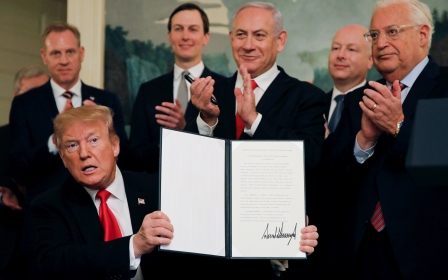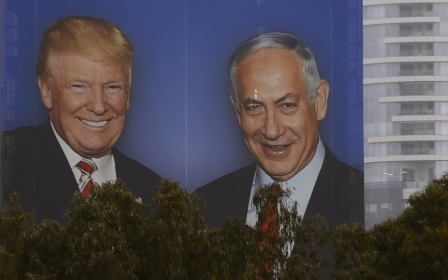US underwrites Israel's economy, while Americans suffer

Israel is around the same size as New Jersey, one of the smallest US states and which contributes nearly $30bn to the US federal budget - very little of which is returned through federal programmes.
A portion of that money ends up in Israel. Indeed, all 50 states rely on some return of their federal taxes for infrastructure, highways, healthcare, education and other programmes. When a portion of that money is used for other purposes - such as aid to Israel - the citizens suffer the consequences.
Military aid
The Washington Report on Middle East Affairs estimates US direct aid to Israel at more than $130bn. Unlike other recipients of US military aid, Israel has in the past been allowed to spend more than a quarter of its annual military aid in Israel, rather than in the US, resulting in an increasingly sophisticated and competitive Israeli defence industry.
As a result, the Congressional Research Service reported that between 2004 and 2011, Israel was the eighth-largest arms exporter, with sales of $12.9bn. In contrast with other countries receiving US military aid, which must purchase through the Department of Defense (DOD), Israel deals directly with US companies and is exempt from DOD review.
Israel is ranked 22nd on the UN Human Development Index, compared to the US at 13th. Despite a lagging GDP, Israel is nonetheless considered a wealthy country, with universal healthcare, affordable higher education and a higher life expectancy than the US.
All Israeli residents are entitled to basic healthcare as a fundamental right, compared to the US, which has one of the most underperforming healthcare systems among developed nations, despite massive spending of $3.5 trillion annually.
On the education front, the annual cost of tuition at an Israeli university, set by the government, is around $3,000, compared with around $10,000 for US residents at state universities.
Tax exemptions
US intelligence officials take an active interest in friends as well as foes, with counterintelligence operations “strategically focused against [the] priority targets of China, Russia, Iran, Cuba and Israel”.
The latter is a US ally, but has a history of espionage attempts against the US; Israel has also consistently deceived the US as to the existence of its nuclear weapons and ballistic-missile systems.
US taxpayers unwittingly exercise great largesse towards the people of Israel, at great detriment to themselves
At the same time, an investigation several years ago by the Forward, which focused on the US Jewish community’s network of charity organisations, “uncovered a tax-exempt Jewish communal apparatus that operates on the scale of a Fortune 500 company and focuses the largest share of its donor dollars on Israel”.
Great largesse
Indeed, in addition to federal budget allocations, there are private charities, local and state governments, and corporations that contribute additional billions to Israel.
US taxpayers unwittingly exercise great largesse towards the people of Israel, at great detriment to themselves. Millions of Americans are without basic healthcare because they cannot afford it. Millions of US university students are deeply in debt from student loans taken to finance their education - all while the US underwrites Israel’s economy.
The views expressed in this article belong to the author and do not necessarily reflect the editorial policy of Middle East Eye.
Middle East Eye delivers independent and unrivalled coverage and analysis of the Middle East, North Africa and beyond. To learn more about republishing this content and the associated fees, please fill out this form. More about MEE can be found here.






